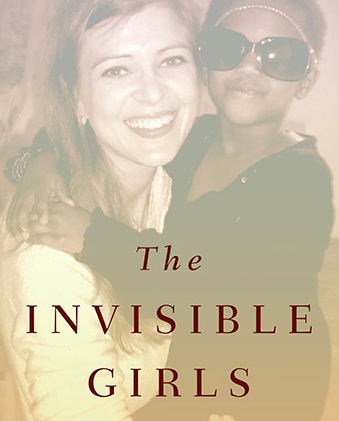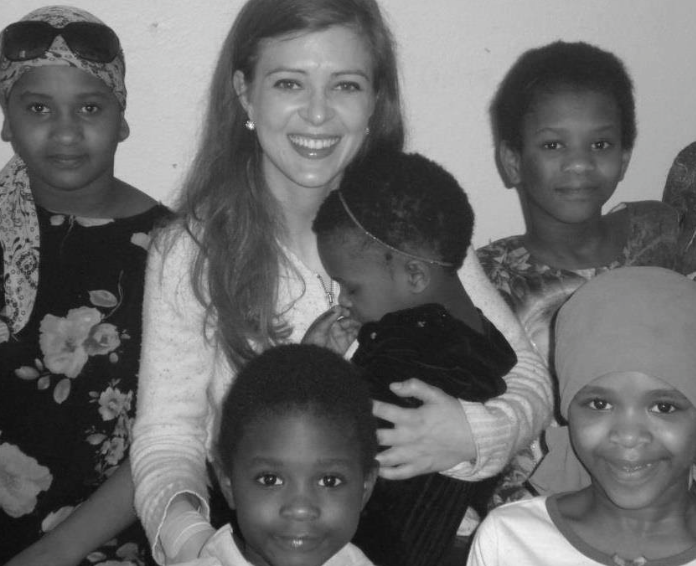On January 6th: Seeking (and being sought by) Epiphanies
In 2012, I had written the first draft of The Invisible Girls, which was basically a collection of stories about the five Somali sisters I met on a train in Portland one afternoon, how we became friends, and what it was like to have a front row seat to their new life in America -- watching their first movie, eating their first slice of pizza, learning to write and read English, and panicking the first time I showed their mom how to turn on the heat in their apartment because they thought the warm air pouring out from behind the wall meant I had set their house on fire. It was a good first draft, but I had a nagging feeling that something was missing.
They had moved from Portland to Seattle, and one Saturday, I decided to take a break from writing and drive up to visit them instead. I spent the day with them, eating pizza (their favorite food!), creating pictures with finger paint and taking lots of silly pictures. Then I went to a hotel to spend the night before driving back to Portland the following morning.
I sat in an overstuffed chair next to the bed in my hotel room in the silence, thinking about the story I was trying to write, wondering what was missing.
And suddenly it dawned on me that what was missing from the story was me.

I had written all about them, but a reader who picked up the book wouldn't know anything about my character in the story -- why I'd ended up in Portland, why the girls resonated with me, why our friendship had become so deep, and why our friendship mattered just as much to me as it did to them (possibly more!)
And suddenly I realized that it wasn't just their story and it wasn't just my story; it was OUR story. Even though we looked different the day I met them on the train -- different ethnicities, skin color, language, religion and socioeconomics -- at the core we were much the same. Because, after nearly dying of breast cancer on the east coast, I'd sold everything and moved to Portland, Oregon, with just a suitcase of clothes and a broken heart, wondering how in the world I was going to start over again. And (in a small way) I understood what it was like to be a refugee of sorts, to nearly die, and then end up in a new place thousands of miles from home with just clothes and a broken heart, wondering how in the world you're going to start over.
Sitting there in that hotel room in the Seattle suburbs, it hit me like lightning. It was the epiphany I'd been waiting for: the real reason these girls resonated with me was because I'd been an Invisible Girl, too.

Today, in Eastern Orthodox and Western Christian traditions, we celebrate the Day of Epiphany.
An epiphany, as my three brothers like to say, is a "mental a-ha!" or, in the (likely apocryphal) story of Archimedes, a powerful insight that hits you so swiftly, it sends you running down the streets naked yelling, "Eureka!" at the top of your lungs.
An Epiphany is a revelation that changes everything. It unlocks a seemingly-impenetrable gate. It unties a maddening mental knot. It frees something in you that's been held in captivity.
The church celebrates two epiphanies that people, according to the biblical narrative, had about Jesus. The first epiphany happened when the wisemen (also called three kings or magi) realized that the baby whose star they'd seen rising in the sky was divine royalty -- the son of the heavenly King, the long-promised Prince of Peace.

The second epiphany was when Jesus asked John the Baptist to baptize him, and John the Baptist realized that Jesus was the long-awaited Messiah.
While some epiphanies we have are about the divine nature of Jesus, there are lots of other epiphanies we need, too. Lots of emotional and spiritual gates we can't wrestle open, lots of mental knots we can't untie, lots of places in us that, in the words of Emma Lazarus, are yearning to breathe free.
This morning I researched the phrase How To Have An Epiphany. While scientists and psychologists haven't figured out exactly how or why epiphanies happen, and no one has an exact formula to follow in order to induce a mental a-ha moment, most of them agree that two things are necessary.
First, you have to gather a large amount of information. Study the problem, measure data, and have conversations with people about it (on an interesting and important side note, the more different the people are from you, the more helpful the conversation is likely to be!). Fill your rational, logical left brain with facts.
And then, stop. thinking. Turn off your left brain and do something completely different from what you usually do. Instead of spinning in mental circles, stop thinking and go for a walk. Swim. Hike. Meditate. Cook. Sew. Paint. Carve wood. Do something that gets you out of your head and into your body. Rest your mind and give the words, the numbers, the ideas, the questions, time to steep.
And that's usually when the best epiphanies occur -- kind of how putting down my manuscript and playing with five giggly Somali refugee girls in Seattle for an afternoon helped me figure out what my book was all about.

Today, on the Day of Epiphany, maybe it's a good reminder for us to be aware of the places in us that are in need of epiphanies -- the locked gates against which we have bruised our shoulders, the mental knots that our fingers ache from untying, the spiritual and emotional vise grips squeezing our souls.
Maybe it's a reminder to be curious and open and diligent about purposefully and intentionally exploring those places.
And maybe it's also an invitation to practice Sabbath -- saving space in our lives (whether it's on Sunday or not) to cease from striving, to surrender to unknowing, to listen with our souls, to trust that, in the words of Rumi, what (or Who) we seek is already seeking us.
***
